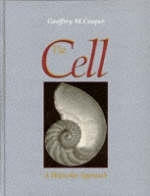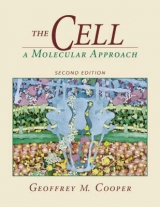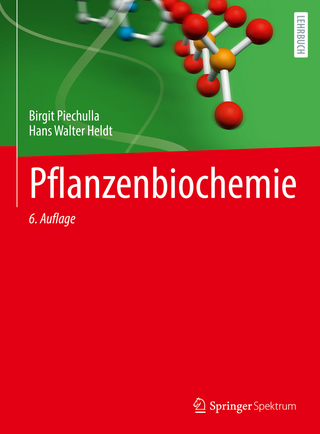
The Cell
Sinauer Associates Inc.,U.S. (Verlag)
978-0-19-850111-4 (ISBN)
- Titel erscheint in neuer Auflage
- Artikel merken
Teaching cell biology can be a daunting task because the field is so vast and moving so rapidly. Now for the first time there is a text that meets the needs of today's students and their teachers. Written by active scientists, The Cell: A Molecular Approach combines the readability and cohesiveness of a single-authored text with comprehensive and up-to-date science. The Cell: A Molecular Approach is an undergraduate text on contemporary molecular and cellular biology that is ideally suited in length and complexity for introductory and intermediate courses. The book focuses on the molecular biology of cells as a unifying theme, with topics such as developmental biology, the nervous system, the immune system, and plant biology being discussed as examples of more general principles. Reviews of selected 'Key Experiments' and topics in `Molecular Medicine' highlight the experimental nature of modern cell biology and convey the excitement of research in this area. The Cell: A Molecular Approach is an accessible and teachable text in modern cell biology.
Dr Cooper has crafted a book that can be covered in a single term, allowing students to master the material in the entire book, rather than sampling a small fraction from a much larger text. Written in an efficient and compact style, the book covers a broad range of material in a direct and pedagogially approachable manner. This book is intended for undergraduate students in cell biology, molecular biology, and biochemistry courses in science and medical facilities.
Part I: Introduction. 1: An Overview of Cells and Cell Research. The Origin and Evolution of Cells. Cells as Experimental Models. Tools of Cell Biology. Key Experiment: Animal Cell Culture. 2: The Chemistry of Cells. The Molecular Composition of Cells. The Central Role of Enzymes as Biological Catalysts. Metabolic Energy. Biosynthesis of Cell Constituents. Cell Membranes. Key Experiment: The Folding of Polypeptide Chains. Molecular Medicine: Phenylketonuria. 3: Fundamentals of Molecular Biology. Heredity, Genes, and DNA. Expression of Genetic Information. Recombinant DNA. Detection of Nucleic Acids and Proteins. Studying Gene Function in Eukaryotes. Key Experiment: The DNA Provirus Hypothesis. Molecular Medicine: HIV and AIDS. Part II: The Flow of Genetic Information. 4: The Organization of Cellular Genomes. The Complexity of Eukaryotic Genomes. Chromosomes and Chromatin. Analysis of Complete Genomes. Key Experiment: The Discovery of Introns. Molecular Medicine: Gene Therapy for Adenosine Deaminase Deficiency. 5: Replication, Maintenance, and Rearrangements of Genomic DNA. DNA Replication. DNA Repair. Recombination between homologous DNA Sequences. DNA Rearrangements. Key Experiment: Rearrangement of Immunoglobulin Genes. Molecular Medicine: Colon Cancer and DNA Repair. 6: RNA Synthesis and Processing. Transcription in Prokaryotes. Eukaryotic RNA Polymerases and Basal Transcription Factors. Transcriptional Regulation in Eukaryotes. RNA Processing and Turnover. Key Experiment: Isolation of a Eukaryotic Transcription Factor. Molecular Medicine: The Pit-1 Transcription Factor and Growth Hormone Deficiency. 7: Protein Synthesis, Processing; and Regulation. Translation of mRNA. Protein Folding and Processing. Regulation of Protein Function. Protein Degradation. Key Experiment: Catalytic Role of Ribosomal RNA. Molecular Medicine: Antibiotics and Protein Synthesis. Part III: Cell Structure and Function. 8: The Nucleus. The Nuclear Envelope and Traffic Between the Nucleus and Cycloplasm. Internal Organization of the Nucleus. The Nucleolus. The Nucleus During Mitosis. Key Experiment: Identification of Nuclear Localization Signals. Molecular Medicine: Systemic Lupus Erythematosus. 9: Protein Sorting and Transport: The Endoplasmic Reticulum, Goli Apparatus, and Lysosomes. The Endoplasmic Reticulum. The Golgi Apparatus. The Mechanism of Vesicular Transport. Lysosomes. Key Experiment: The Signal Hypothesis. Molecular Medicine: Gaucher's Disease. 10: Bioenergetics and Metabolism: Mitochondria, Chloroplasts, and Peroxisomes. Mitochondria. The Mechanism of Oxidative Phosphorylation. Chloroplasts and Other Plastids. Photosynthesis. Peroxisomes. Key Experiment: The Chemiosmotic Theory. Molecular Medicine: Diseases of Mitochondria: Leber's Hereditary Optic Neuropathy. 11: The Cytoskeleton and Cell Movement. Structure and Organization of Actin Filaments. Actin, Myosin, and Cell Movement. Intermediate Filaments. Microtubules. Microtubule Motors and Movements. Key Experiment: The Isolation of Kinesin. Molecular Medicine: Muscular Dystrophy and the Cytoskeleton. 12: The Cell Surface. Structure of the Plasma Membrane. Transport of Small Moleculars. Endocytosis. Cell Walls and the Extracellular Matrix. Cell-Cell Interactions. Key Experiment: The LDL Receptor. Molecular Medicine: Cystic Fibrosis. Part IV: Cell Regulation. 13: Cell Signaling. Signaling Molecules and Their REceptors. Functions of Cell Surface Receptors. Pathways of Intracellular Signal Transduction. Signal Transduction and the Cytoskelton. Key Experiment: The Src Protein-Tyrosine Kinase. Molecular Mecicine: Cancer, Signal Transducfgion, and the ras Oncogenes. 14: The Cell Cycle. The Eukaryotic Cell Cycle. Regulators of Cell Cycle Progression. The Events of M Phase. Meiosis and Fertilization. Development, Differentiation, and Programmed Cell Death. Key Experiment: The Discovery of MPF. Molecular Medicine: In Vitro Fertilization. 15: Cancer. The Development and Causes of Cancer. Tumor Viruses. Oncogenes. Tumor Suppressor Genes. Applications of Molecular Biology to Cancer Prevention and Treatment. Key Experiment: The Discovery of Proto-oncogenes. Molecular Medicine: Acute Promyelocytic Leukemia and Retinoic Acid
| Erscheint lt. Verlag | 1.1.1997 |
|---|---|
| Zusatzinfo | 585 illustrations, bibliography |
| Verlagsort | Sunderland |
| Sprache | englisch |
| Maße | 210 x 280 mm |
| Gewicht | 1946 g |
| Themenwelt | Naturwissenschaften ► Biologie ► Biochemie |
| Naturwissenschaften ► Biologie ► Genetik / Molekularbiologie | |
| Naturwissenschaften ► Biologie ► Zellbiologie | |
| ISBN-10 | 0-19-850111-0 / 0198501110 |
| ISBN-13 | 978-0-19-850111-4 / 9780198501114 |
| Zustand | Neuware |
| Haben Sie eine Frage zum Produkt? |
aus dem Bereich



